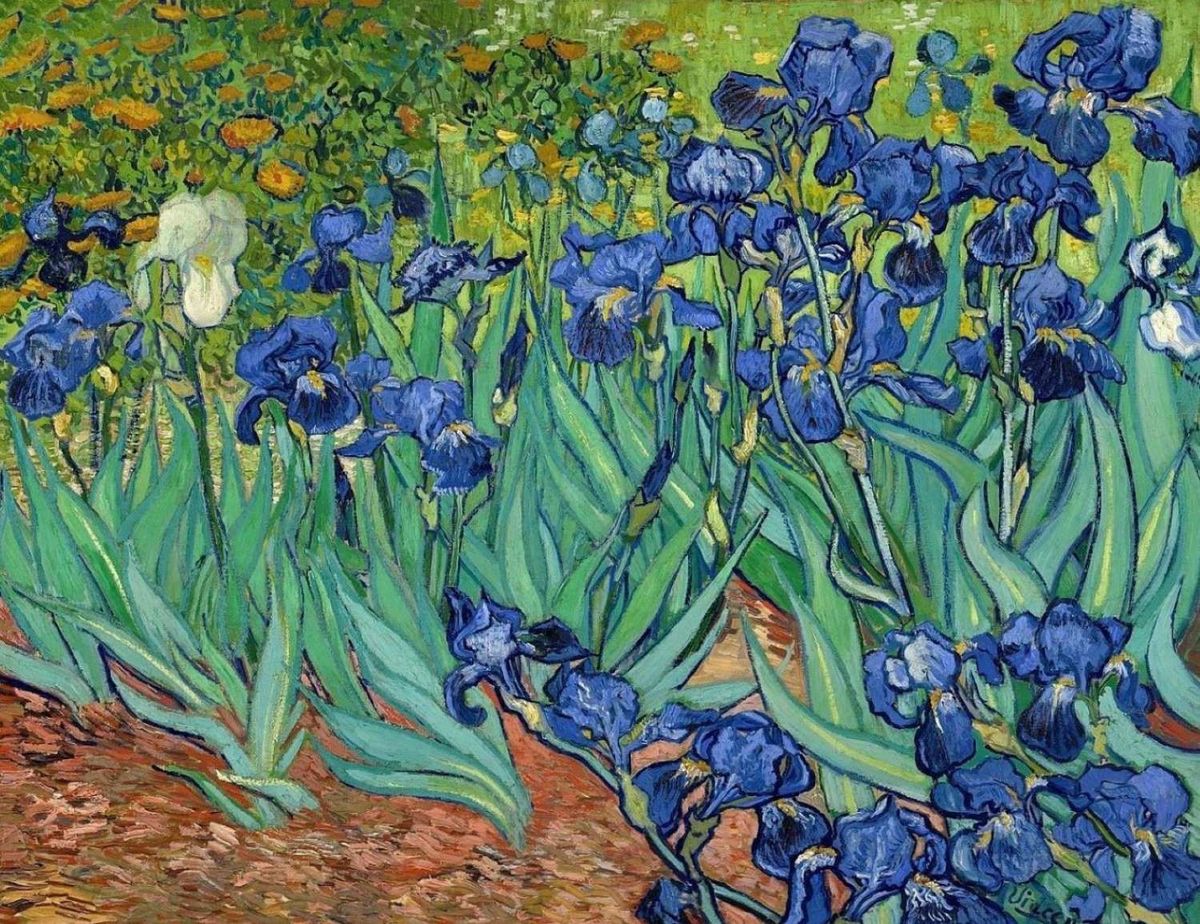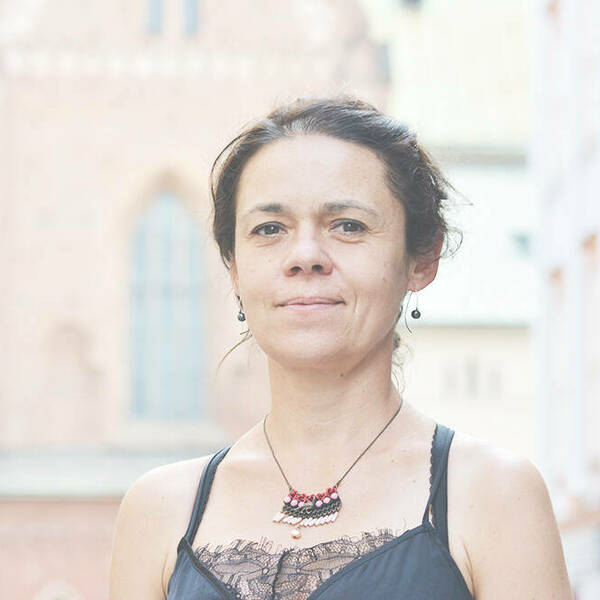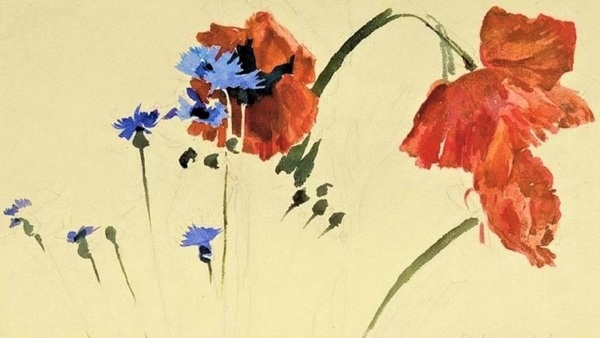You who do not remember
passage from the other world
I tell you I could speak again: whatever
returns from oblivion returnsto find a voice:
from the center of my life came
a great fountain, deep blue
shadows on azure seawater.
—Louise Glück
The recipient of the 2020 Nobel Prize in Literature, Louise Glück, is an erudite and contemplative poet comfortable in shuffling mythical, religious, mystical, and literary references. However, in a recent interview she shared a painful story of her inability to write for an extended period when she lived in Vermont. This story shed light on a struggle not only hers, but common to many writers. At that time, she could only read gardening catalogues. But there was one given line in her head that played over and over again: “At the end of my suffering there was a door.”
Amidst these roadblocks she went to the garden and forced herself to write a poem about a flower. The next day she wrote another poem about another flower. On the third day, she knew what to do. And her collection Wild Iris, published in 1992 (and awarded the Pulitzer Prize), came to being in eight weeks. When she finished she had no memory of making it. It felt stolen. It felt like it came from someone else.
The book sounds like an act of recreating the world after coming back from a harrowing experience of darkness and depression. It reenacts the experience of grappling with faith. There are three distinguishable voices in the book: voices of flowers, the voice of a Gardener/poet, and the voice of the Divine (addressed sometimes as father or Father).
The titular “Wild Iris” introduces a polyvalence of references. It is written from the perspective of a wild iris and it alludes to the myth of return from death, reminiscent of Hades or the myth of Persephone. Literally speaking, a wildflower with consciousness and wisdom offers its perspective, but this same iris could also be read as the mythological daughter of the sea god Thaumas and an Oceanid, and sister of the Harpies. In the myth, Iris is a bridge between humans and Olympian gods, serving as a messenger. She is also the goddess of the rainbow that connects earth with the sky. She can travel as fast as the wind to both the bottom of the sea and the underworld.
In contrast with these mythological references, the next two poems, entitled “Matins”, allude to the Catholic liturgical tradition of the Liturgy of the Hours practiced by clergy and the religious to sanctify each day. The Second Vatican Council revised the Liturgy of Hours into seven canonical hours, including matins and vespers. The hours rely heavily on psalms and have division of voices: there is antiphon 1 and 2—a voice that initiates and one that responds. Often when prayed by groups of people, chanting in two choirs is involved so the prayer is both dialogic and musical.
Analogical to the structure of Catholic Hours, Glück’s book is comprised of seven poems called Matins and ten Vespers. In her lyric sequence, all voices (or personas) engage in conversations. Yet, the voices are not rigidly delineated but ambiguous, overlapping, and bleeding into each other. In the opening poem “Wild Iris”, we read:
You who do not remember
passage from the other world
I tell you I could speak again: whatever
returns from oblivion returns
to find a voice . . .
This poem could be read either as the voice of a wild iris or the voice of the poet.
The poem alludes to great suffering to the point of annihilation of the self. Departing from the underground of suffering, depression, or the dark night of the soul might also be a valid trope here. The next poem, “Matins,” offers another reference to depression: “depressives hate the spring.” Skipping one line, a speaking voice narrows the statement into: “being depressed, yes, but in a sense passionately/ attached to the living tree, my body/ actually curled in the split trunk, almost at peace/ in the evening rain/ almost able to feel/ sap frothing and rising.” The poem suggests the trajectory from the dark night of the soul into romantic fusion with nature.
The next poem is reminiscent of Genesis and addressed to the unreachable father after the exile from heaven. The Greek word for exile, xeniteia, was meant originally for monks in antiquity—a detachment, going away to the desert to get closer to God. Analogically, the lyric sequence takes place in the earthly garden, after the exile from heaven. The trajectory is not linear, but circular, as these poems meander with recurring themes.
But overall we travel from the underworld of immense suffering to the natural world, and through the natural world to questioning and protesting the Infinite Mystery. Daniel Morris in The Poetry of Louise Glück, suggests that:
The consistent but shifting format enables readers to chart a speaker’s volatile emotional course—in the same way a photograph would if taken of the same person standing in the same place but at different times of the day and over several months.
These discursive, lyrical poems engage in constant conversation with an unknowable father, aiming at dialogue. God’s voice also responds in several poems: “Spring Snow,” “Retreating Wind,” and “April” among others. Some poems such as “Witchgrass” are reminiscent of God responding to Job. As in Job’s soliloquy, Glück’s sequence is mournful, addressing loss, despair, nostalgia, immense suffering.
Monsignor Lorenzo Albacete, in God at the Ritz, claims that suffering indicates the transcendence of the human person. He writes: “The suffering of human beings is a sign of God. What this God is like is another question.” This sense of suffering as a sign of transcendence pervades Glück's poems. These poems never attempt to reduce or rationalize suffering, like Job's friends who try to explain away his loss. Rather, in Glück's poems, suffering indicates human transcendence by provoking the one who suffers to address God.
In this sense, these poems very much palpitate with the religious sense or even religious experience. Albacete defines religious experience as “a way of experiencing this world as a sign of a reality that is always beyond its limits.” Accordingly, in Glück's poems, suffering is a religious experience in that it leads the one who suffers to look beyond the limits of the world and address herself to that beyond.
Similar to another Glück collection Vita Nova, there are also references to Dante’s journey in Wild Iris. In the poem spoken by a trillium, a solitary three-petaled flower, we are reminded of Dante’s famous opening of the Inferno. Glück writes, “When I woke up I was in a forest.” There is a ladder in the poem “reaching through the firs,” possibly a reference to Jacob’s ladder (the sequence features a subsequent poem entitled “The Jacob’s Ladder”—a wildflower but also a reference to Jacob’s ladder in Genesis). Once again we have a transition from loss and darkness into heaven, possibly the moon and stars, as the poem takes place at night.
Giacomo Leopardi’s “Night-Song Of A Wandering Shepherd of Asia (XXIII)” comes to mind:
Often as I gaze at you
hanging so silently, above the empty plain
that the sky confines with its far circuit:
or see you steadily
follow me and my flock:
or when I look at the stars blazing in the sky,
musing I say to myself:
“What are these sparks,
this infinite air, this deep
infinite clarity? What does this
vast solitude mean? And what am I?”
Like flowers that are dependent on a gardener, the Gardener-Poet in the poems also seeks transcendent dependence. However, the Mystery is indiscernible and unknowable in Glück’s lyrical sequence. At first, the voice of the Gardener addresses God as “unreachable father.” In the next “Matins,” God is portrayed as “unconceivable” via human imagination.
Forgive me if I say I love you: the powerful
are always lied to since the weak always
driven by panic.
I cannot love
what I can’t conceive, and you disclose
virtually nothing: are you like the hawthorn tree,
always the same thing in the same place,
or are you more the foxglove, inconsistent, first springing up
a pink spike on the slope behind the daisies,
and the next year, purple in the rose garden? You must see
it is useless to us, this silence that promotes belief
you must be all things, the foxglove and the hawthorn tree,
the vulnerable rose and tough daisy—we are left to think
you couldn’t possibly exist. Is this
what you mean us to think, does this explain
the silence of the morning,
the crickets not yet rubbing their wings, the cats
not fighting in the yard?
Is God in the above poem presented as a cloud of unknowing, or is this Yahweh whose name was revealed to Moses as four Hebrew consonants and whose pronunciation was forbidden in the Jewish tradition? God reveals himself to Moses as He Who Brings into Existence Whatever Exists. He is beyond comprehension and description. Furthermore, St Paul’s “Aeropagus Speech” in Acts 17:23 comes to mind in which he praises Greeks for their religiosity and mentions an altar “To An Unknown God” the Athenians worshipped. In his sermon Paul specifies further this unknown, foreign God:
He made from one blood every nation of men to dwell on all the surface of the earth, having determined appointed seasons, and the boundaries of their dwellings, that they should seek the Lord, if perhaps they might reach out for him and find him, though he is not far from each one of us.
Glück intuits both the nearness and inscrutability of the unknown God, as well as the frustration resulting from the inability to “pinpoint” the Mystery of God.
In the following poem, in response to one discussed above, the voice of the Gardener rebukes herself for speaking to Infinity in a personal way. The mystery seems remote, absent. Yet the speaker’s agnosticism is punctured with a desire for a human, personal God.
The next poem, spoken by Scilla—a collective flower that spreads in waves and offers the best blues—is yet another counter-response to the desire for an individual relationship with God: “Not I, you idiot, not self, but we, we—waves/of sky blue like/a critique of heaven,” says Scilla to the Gardener.
Somewhere in the middle of the book there is a shift from lower case father to capital Father. A Matins sequence starts as an accusation, a protest, and transitions to a prayer:
I am the lowest of your creatures, following
The thriving aphid and the trailing rose—Father,
as agent of my solitude, alleviate
at least my guilt; lift
the stigma of isolation, unless
it is your plan to make me
sound forever again . . .
In counter-response, field flowers, acting as naysayers, respond by cynically provoking doubt again:
What are you saying? That you want
eternal life?[…]
O
the soul! the soul! Is it enough
only to look inward?
Perhaps the flowers could be understood as splintered identities of a wounded self, and the whole sequence a dramatic monologue. I concur with Daniel Morris who in The Poetry of Louise Glück, proposes that: “The tonal similarity of these voices suggests that the dialogism of these grouped lyrics is really a foil for an internal conversation.”
The voice seems to waver and mature and waver again. The religious sense shifts from questioning to wonder in the next “Matins”:
I am ashamed
at what I thought you were,
distant from us, regarding us
as an experiment…Dear friend,
Dear trembling partner, what
surprises you most in what you feel,
earth’s radiance or your own delight?
For me, always,
The delight is the surprise.
From Matins we move towards Vespers as a transition from morning questioning and doubt, to evening maturation and a more intimate, personal relationship with God. The first “Vespers” sounds almost like intimate teasing of God: perhaps you exist but in warmer climates where fig trees grow. “Perhaps they see your face in Sicily; here we barely see the hem of your garment.” The complaint directed to God is much more tender, intimate than at the beginning of the sequence: “And no one praises more intensely than I, with more/ painfully checked desire.”
The tenderness also manifests itself as humor in conversation with the Divine in a Vespers poem reminiscent of one of Christ’s parables of a vineyard:
In your extended absence, you permit me
use of earth, anticipating
some return or investment. I must report
failure in my assignment, principally
regarding the tomato plants.
Yet another significant transition takes place in recognizing God in the human being, hence intuiting incarnation. God descends into human flesh, becomes one of us.
I don’t wonder where you are anymore
You’re in the garden; you are where John is,
In the dirt, abstracted, holding his green trowel.
The whole sequence takes the shape of a love affair between creation and a Creator. When human desire is exhausted, it reaches beyond; it transcends.
why would you wound me, why would you want me
desolate in the end, unless you wanted me so starved for hope
I would refuse to see that finally
nothing was left to me, and would believe instead
in the end you were left to me.
In “Lullaby” the lover, God, responds to his beloved with affection and tenderness:
Time to rest now; you have had
enough excitement for the time being.[…]
Don’t think of these things anymore.
Listen to my breathing, your own breathing
like the fireflies, each small breath
a flare in which the world appears.I’ve sung to you long enough in the summer night.
I’ll win you over in the end; the world can’t give you
this sustained vision.You must be taught to love me. Humans being must be
taught to love
silence and darkness.
The overall sequence is an intimate conversation with God, which becomes—in its meanderings and storming of the walls of mystery—a twisted journey of an apophatic via negativa that in the end leads to the light and the maturation of the relationship between the child and the Father.
Wild Iris is an act of recreating the world. And the suffering in that birthing is palpable. It also is a testament to the hope that at the end of each suffering there is a door. It is also a reminder that our own creations are not just the product of our will; that just like a flower depends on a seed, a gardener, so too a gardener depends on the Gardener. The book helps to intuit that it is not through our efforts that we receive grace. We must unearth that gift, a treasure. It is like a seed whose flower comes from someone else beyond the gardener or the soil.


